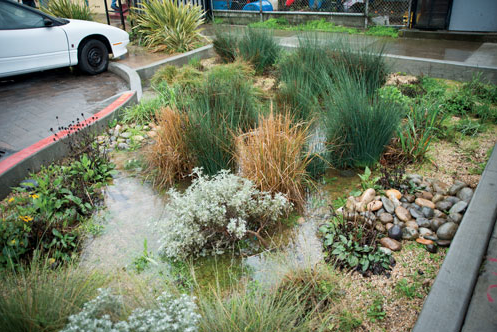Every city faces costs associated with water management – among them the capital and operating costs of moving and treating stormwater. Globally, many municipalities are recognizing the role of “green infrastructure”, such as rain gardens, bioswales, and urban forests, for providing natural and cost- effective stormwater management services. While municipalities can easily plan and implement green infrastructure opportunities on public lands, harnessing opportunities on extensive areas of private property presents a challenge. Here, Market Based Instruments (MBIs) – including stormwater user fees – are an effective economic tool.
Over 15,00 cities in the United States have implemented some form of stormwater user fee or utility. That number is smaller in Canada, but growing, including Victoria, Kitchener, Waterloo, Mississauga, Edmonton, and Saskatoon.
Why introduce a Market Based Instrument? Stormwater management services have traditionally been covered by property taxes, meaning that property owners pay a set fee that does not reflect their actual usage amount. Additionally, there are no dedicated funds for maintenance and renewal of this infrastructure. Moving to a user-pay system creates an opportunity to encourage property owners to capture rain on site and reduces the amount of runoff entering the municipal stormwater system. The funds acquired through stormwater fees also provide a dedicated municipal revenue stream for infrastructure renewal.
In Canada, the use of green infrastructure for stormwater management is gaining momentum. The City of Vancouver recently proposed a long-term target to capture and divert 90 percent of its average annual rainfall to green infrastructure. The City of Kitchener is developing an Integrated Stormwater Master Plan that encourages the use of green infrastructure. How can municipalities encourage even more green infrastructure? There are stormwater user fee credit or discount programs. For example, the City of Victoria’s Rainwater Rewards Program, provides an additional incentive for property owners to manage rainwater on site. The City of Philadelphia’s SMIP and GARP programs, provide grants to property owners and/or contractors for green infrastructure projects. In Philadelphia’s case, they have found it to be 60-65 percent cheaper to invest in these projects on private property than construct projects on public lands.
Washington, D.C. has developed a Stormwater Retention Credit (SRC) trading market by allowing regulated projects to purchase stormwater credits from third-party projects. Prudential Investment in collaboration with the Nature Conservancy and Encourage Capital, are investing $1.7 million towards green infrastructure projects in D.C.. The Washington DOEE has also just announced that they will be investing $12 million to support a new SRC Purchase Agreement Program, where stormwater credit suppliers can choose to sell their credits directly to the DOEE, providing some certainty in the new credit market. The use of Stormwater Retention Credits in Washington will be discussed in an upcoming webinar on 25 May featuring Matthew Espie from Washington, Department of Energy and Environment.
As municipalities discover the value of incenting green infrastructure, not just for rainwater management but for providing additional social and environmental benefits and creating more livable communities, MBIs and other economic tools will be increasingly important additions to any sustainable community toolkit.
For additional information, check out GCC’s Soak it Up! Toolkit and Sustainable Prosperity’s Incenting the Nature of Cities report.
This article was published in The Umbrella Stormwater Bulletin Issue 44.
Author: Sara Jane O’Neill, Senior Research Associate, Sustainable Prosperity
Poll
What market based instrument would encourage you to make changes to your home or commercial property so that it captures rain onsite?
- A user fee credit or discount program (5%, 1 Votes)
- Grant programs to help pay for retrofits (16%, 3 Votes)
- A stormwater retention credit trading program (0%, 0 Votes)
- All of the above (68%, 13 Votes)
- None of the above (11%, 2 Votes)
Total Voters: 19


